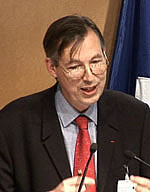Still historians see 1848 as a turning point in political, economical and social way, the final triumph of the middle classes. There is a considerable chance that democratic ideals in the Arabic world cannot be realized on short term, because other groups are still much better organized. However, the Arabic world will be never be the same as it was before. What prompt consequences may be, the Arabic world will change fundamentally on long term and will become part of the modern world.
Concerning policies of the Western countries with regard to Arabic countries, Heisbourg recommended to define first the areas with the greatest interest. According to him, it should be the Gulf and Egypt. Next to it, he meant that Europe should make use of her good experiences with the transition of Mid- and Eastern European countries. Barroso (European Commission) is doing good initiatives in that direction.
Heisbourg also went into the matter of the very fast changings in the present world: very large problems in Japan and the mass unrest in the Arabic world. It seems that international context now (call it globalizing) changes the world just as fast as during the collapse of the Sovjet Union, twenty years ago, did. According to Heisbourg there was raise of a 'rupture stratégique. For a long time visible trends, as the uprise of China and l'éppaisseur du monde', accelerates.
Next to it, there is the actual question: will - in Hegeliaans: apportionment from quality in quantity - these substantial quantitative changes change the world qualitative too? To get some grip on this problem, Heisbourg used a classification of trends as used by Donald Rumsfeld, the former US Minister of Defense. "There are known knows, known unknows and unknown unknowns". About this last category - things of which we don't know that we don't know - we cannot say much (except that we have to be careful with our predictions), but with the two other categories we can get going.
Heisbourg started with some known knowns, developments of which we do know that we know them:
|
|
the ongoing uprise of China (to mention: China is already the largest exporter of industry-products, the largest CO2-producer and the biggest internal car-industry;
-
the continued uprise of many not western countries ('the rise of the rest'). These countries have a more than proportional share in growth within the world-economy (by which globalizing more and more is dewesternizing) and of world-wide military expenditures (all BRIC's are in the top ten list of countries with the biggest military expenditures);
-
the enormous increase of debt in western countries (as opposed as the financial situation in emerging not-western countries). Striking is that both sides of the western world are handling this in complete different ways: the US will grow first and than pay-back, Europe will pay back first and than than make growth. Time will learn what is the best strategy;
-
the almost silent downturn of Japan, of which share in the world economy decreased half in the past 20 years. Japan has the greatest debt of all industrial nations. Will Japan become benign decline (a mild, quiet reversion, without violence), Heisbourg questioned, a model for Europe in the years to come?;
-
the problems of Russia, that has to realize that prices of energy also can drop. Russia is more and more in the shadow of China (Chinese economy grows with 10 percent a year, while Russia's economy shrinks as much as the same). Russia is a wearisome Saudi Arabia of the north, it has to make the economy more diverse, but is probably not able to do so;
- the remarkable good assimilation of the international crisis by the poor countries, while all pesimistic predictions (about for instance fall of prices of raw materials and less transfers by migrants) came out. How is it possible that poor countries are able to do it relatively good? According to Heisbourg, it could be related to the fact that by the digital revolution the partition between poor and rich, as well as international as internal, is diminished considerable.
|
|
Hereafter, Heisbourg delivered some known unknowns, developments of which we know that they are going, but of which the outcome is not sure:
-
again first China: internal developments (how will government handle political resistance, societal inequality, degradation of the environment, etc?) as well as international. How will China international perform? The careful and reserved policy, started by Deng Xiaoping will become less opportune. China has grow enormously, by which, if the country will do nothing, impact is still to feel in the world. ‘When you are an 800 pound
gorilla, there is no way you can avoid upsetting the system, even if you
don’t want to do that.’ It is just too big, but China itself does not realize this;
-
the nature of the relation between 'the West and the rest': will conflicts get the upper hand or will relationship be characterized by constructive cooperation? But also inside the West and inside the rest are relations of importance, which will not let predict as US-EU and India-China;
-
the future strength of the West. Will the economy of the US recover? And what will rest of political power of Washington? Concerning Europe: when and how will it reach limits social-economical and political when it tighten the belt? And how will it turn out with the euro?
Measures by the eurozone can regular EU-cooperation undermine. On what will Europe focus: the EU at the cost of the euro, or the euro at the cost of the EU?;
-
What may we expect from the still poor countries in Latin-America and Africa? Will they also emerge? Will the information revolution give these continents new economical and political power?
|
